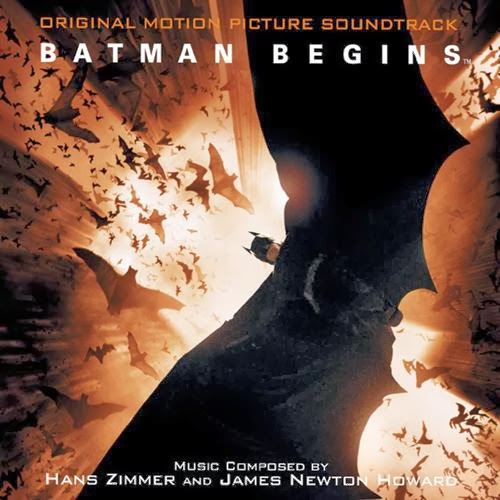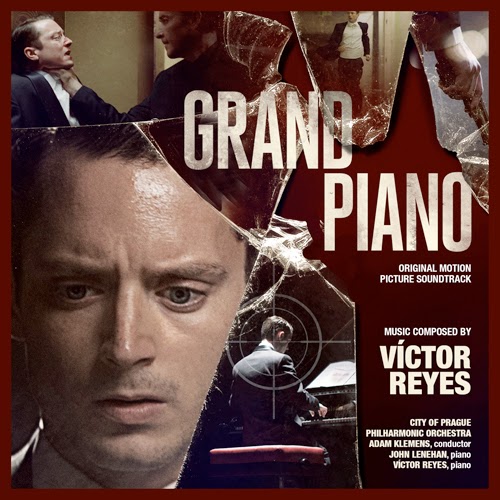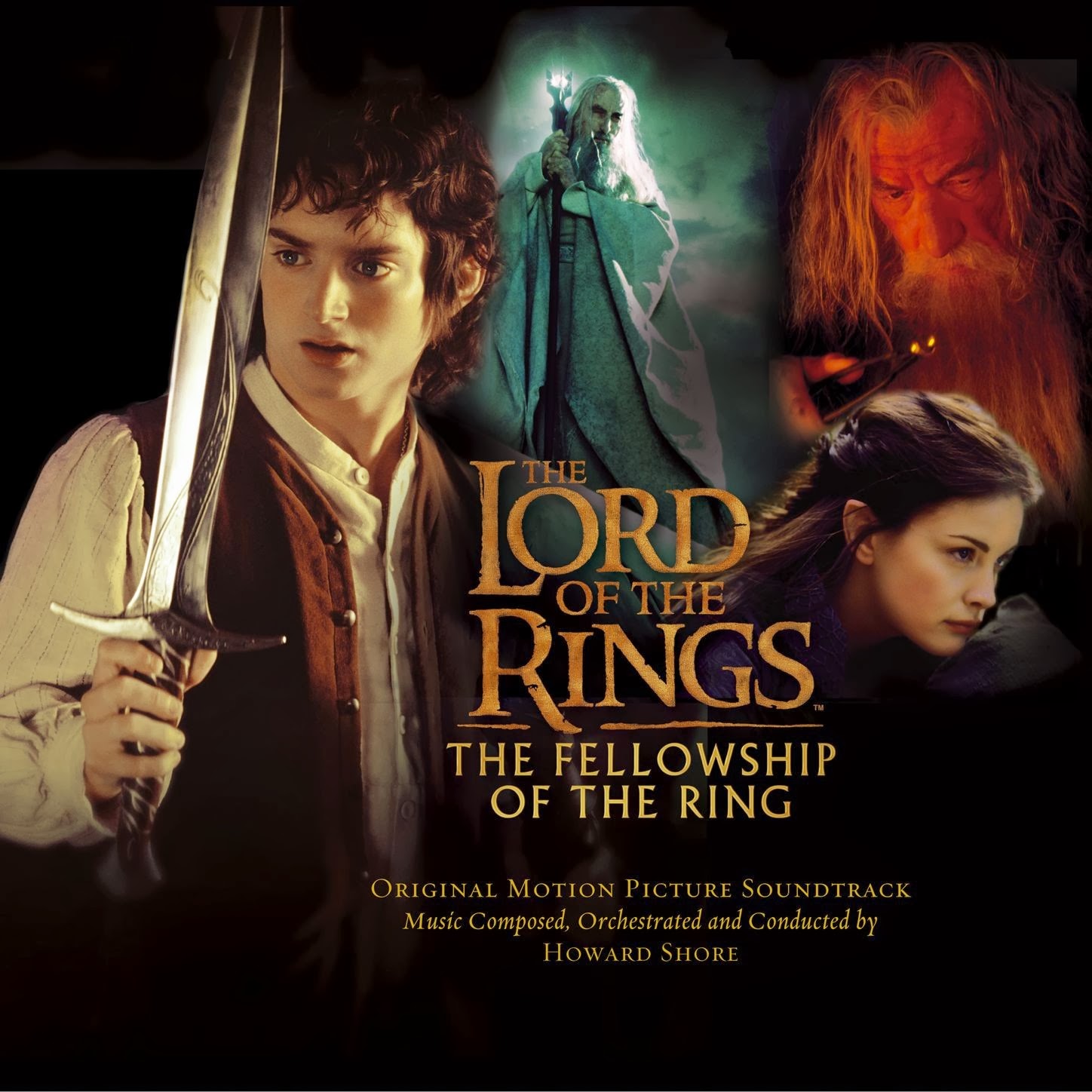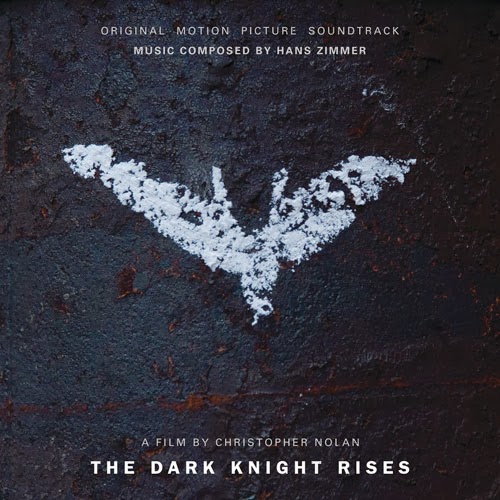THE DARK KNIGHT TRILOGY SCORE REVIEWS
I've been preparing this for a while; I wanted to deliver reviews to all three separately, but I saw this as an opportunity to review them as a compilation instead. Whilst the reviews aren't as fleshed out as they are usually, I believe they are adequate in portraying my thoughts on the scores. Enjoy!

BATMAN BEGINS
Christopher Nolan's first piece in the puzzle for rejuvenating audience's attention towards the caped crusader, Batman, came as a startling surprise for everyone during 2005. After the hero fell so far from grace in 1997, with the atrocity Batman and Robin, audience's expected nothing more than a Batman film which looked towards Tim Burton's Batman for inspiration. But audiences were caught off guard by a smart, inventive, realistic portrayal of the superhero, and so Batman Begins quickly become a huge hit, for not only Christopher Nolan, but Warner Brother, and more importantly, DC Comics, whom had some tough years before the smash hit was released to audiences. DC had partnered with Warner Brothers in 2004 to release the universally hated Catwoman, starring Halle Berry, and needed to create something a little more realistic and relatable. Batman Begins was just that and quite a bit more, and so paved the way for the next branch of superhero films.
For the scoring side of things, Christopher Nolan set out to recruit Hans Zimmer. Zimmer then requested that Nolan take on James Newton Howard, a man of whom Zimmer had always wished he could collaborate with. And henceforth we have two very talented composers collaborating together on one of the biggest projects of 2005; revitalizing one of the biggest superheros in comic book history in the scoring sense. Their execution is both good and bad, but leaning more on the good side of things. Unlike the scores I'm to talk about after this, Batman Begins is filled with much less memorable music. The most outstanding piece in the entire effort is certainly Molossus, the main action piece in the score. It's a brilliant blend of Zimmer's expertise in electronic music, and Howard's orchestral grace, and never seems to stop from the second it starts. The rest of the score is quite, dare I say it, boring! Whilst beautifully composed, Zimmer and Howard really don't create anything that stands too far out from the bunch, apart from the already mentioned Molossus. It's not standard Zimmer or Howard, yet it doesn't really move along with enough speed or excitement. So much of this score is emotional backdrop to the film that really doesn't stick with you. Despite the relative complexity of these emotional, dark riffs and melodies, they really don't have all too much appeal. The final piece on the card, Lasiurus, simply lasts much too long for what it was going for. Almost 7 and a half minutes of beautiful music, yet a little too uneventful for my taste. This is a Batman score, for crying out loud! I expect a lot of really good action pieces, which I never seem to receive! Even when I do, it's in moderation, as Zimmer and Howard never really seem to let the music just explode and go to greater heights. It can be quite infuriating!
The theme is a slow buildup, that ostinatos to a climax which is incredibly satisfying, consisting of a lot of synth, brass, strings and Zimmer's favourite; percussion! You can see both Howard and Zimmer's touch on the theme; the sound production, with various flapping noises, and other bat-like sounds all belong to Zimmer, as well as the outstanding percussion. Zimmer has had a way with percussion for as long as his career has spanned. Howard's part in the theme, orchestrating and composing the main, 90 piece orchestra, is sublime, and deserves only acclaim. Both have their way with the theme and find common ground, which means only good things. The piece Barbastella also introduces us to Bruce's theme; it's much more solemn than Batman's, and is fleshed out by a fantastic choir of vocalists, who do a wonderful job at making us feel empathy for the character of Bruce Wayne. Yet despite these wonderful, individual themes, Batman Begins still seems to lack a large number of discernible themes, all different from each other, something that neither The Dark Knight or The Dark Knight Rises failed at doing. I see no theme for the Scarecrow here, one of the main villains in the film. If there does happen to be one, I can't seem to find it, as it's lost in the cluster of smaller, insignificant themes that Zimmer and Howard have dropped all throughout the score. Zimmer and Howard have managed to infuse the score with themes for emotions and ideals though; not necessarily physical things within the film, but still important characters in their own right. Fear is a common theme that Christopher Nolan tries to represent in Batman Begins and the rest of The Dark Knight trilogy, and Zimmer and Howard do manage to emulate moments of the emotion. The piece Artibeus is flooded with sharp strings which are certainly heart pumping as they leap out of nowhere. Maybe this is what Zimmer and Howard had set aside as a theme for Scarecrow? I can't say for sure. Nonetheless, the lack of themes for key heroes and villains shows in this less than memorable score.
Batman Begins is a decent starter for a brilliant trilogy in film music history. It is masterfully composed, with enough action to just satisfy; yet still, it seems there could've been so much more that both Zimmer and Howard could've done to really made this something of it's own. The lack of critical themes and overload of seemingly emotional, character driven music is too much for my ears. Batman Begins is a sure disappointment; yet still, it's the only score in Nolan's Batman trilogy that I can listen to as an uninterrupted suite, and that has to count for something!
Junkie Score: 71.21
THE DARK KNIGHT
The second piece in Christopher Nolan's trilogy is for some the best film of them all; to that I agree. The Dark Knight is a complex thriller, that surpasses all it's genre expectations. Many would say that The Dark Knight is the one film that revolutionized what directors and writers could do with superheroes. It pushed audience's, and for once, didn't go for the nostalgic effect, nor the colourful, comic book like tone that we'd become accustomed to for these types of films. Sure, Batman Begins was a fantastic opener, but ultimately, this is the main event. The second part in a trilogy is certainly the hardest to perfect, yet Nolan managed to pull it off, in a seemingly perfectly packaged bundle. We got one of the most brilliantly executed villains in film history in The Joker, a top-notch performance from Aaron Eckhart as Harvey Dent/Two Face, the big shot lawyer who goes from Gotham's hero to it's own worst enemy, and a story which seems to only improve over Nolan's last outing with Batman. It's one of the most mesmerizing, quality films of the past decade, and deserves it's place on the Top 250 Films of all Time, by IMDb.
When it came to scoring the film, Nolan again recruited the brilliant men Hans Zimmer and James Newton Howard, both of whom were not at all reluctant to return to the sequel. This time, though, the score seems to be fleshed out more, and each individual piece is worthy of note; it's not so much a suite, like Batman Begins was. Instead, every minute of music is it's own thing. Zimmer and Howard never seem to be repeating ideas here; they consistently create ever changing and evolving music, which means that the listening experience is ever varied. The quality of orchestral and electronic music here is as good as it was in Batman Begins, excluding one piece that I will make mention of quickly. The first piece on the card, Why So Serious, is set as the theme for The Joker, and includes some 9 minutes of ear piercing, synthesized crap! It's not only repetitive; it's plain irritating. It certainly doesn't show of the ingenuity of the two men composing and orchestrating. In concept, Zimmer intended to create something that was meant to evoke an irritating reaction from the audience; he wanted The Joker's theme to be something that had audiences angry. To do so, Zimmer used razors upon various stringed instruments, most notably Zimmer's favourite, the cello. Whilst Zimmer did create the desired effect, I would've certainly preferred this piece off the album completely, with fragments inserted into other pieces. I'm sorry, but 9 minutes of this music is criminal! To inflict this upon any listener is just not ethically or morally right! Fortunately, straight after this terror of a piece, we are delivered my favourite track on the card, I'm Not A Hero. It's filled to the brim with what I was expecting off of Batman Begins, that being action! Here, Zimmer and Howard finally allow us to sit back in our seat and enjoy some fast paced, varying music. It also reintroduces us to the theme for Batman, which is further explored in this score. Whilst it's heroic nature is somewhat reminiscent of previous Batman scores, Zimmer and Howard make sure that the dark undertone is still present, which is good to see. That's what makes The Dark Knight trilogy so individual; the fact that the dark undertone is left within the vast majority of tracks on the score card. Most composers who have the pleasure of writing a score for a superhero film don't generally go the dark, harsh route. The final cue on the card, the self-titled The Dark Knight, a 16 minute suite of Batman material, is also another showcase of what Howard and Zimmer have been able to do to expand upon the character of Batman. The piece indulges in music that represents both physical and moral peril on Batman's side, and it's interesting to listen to and absorb. He's no longer the completely incorruptible legend that he was in Batman Begins. He's now at risk of becoming the villain, and that has consequences upon the character. Zimmer and Howard recreate the turmoil with a more solemn, sadder tone than Batman Begins sought to, with some more beautiful vocals and a lot of great music from the cellos. It all fits together beautifully to allow for some of the best 16 minutes of music you'll ever hear.
The theme for Harvey Dent, explored in the piece Harvey Two-Face is a Howard standalone, which is perfectly composed. 6 minutes of exquisite music; there's no other way to describe it. The piece contains both of Harvey's personas that are introduced to us within the film, both good and evil. Whilst the score is climbing to an almost heroic climax, you still hear that flip side to the savior of Gotham, the dark tone of Two-Face. It's such a brilliant combination of personalities and theme! The rest of the score is a constant battle with heroism and villainy it seems; themes play out, and it seems as if both sides of the scale are battling against each other, trying to wage dominance. Batman Begins had a heroic tone to the score as a whole, as even when the score reached darker periods, an uplifting beat or melody would swoop in and save the day. The Dark Knight is completely different. Like the film, heroism is tested, as is bravery and incorruptibility, yet it seems to be defeated by the dark undertones and the evil personality of The Joker. The Joker also brings something to the table that we didn't see in Batman Begins; unpredictability. Batman Begins was quite predictable, whilst here, The Joker turns the tide. Not every piece moves coherently in a single direction. Various tracks spasm off into unknown territory that Zimmer and Howard never dared to explore within Batman Begins, but challenge you to listen to here. It seems to make no sense, until it comes to it's final resting place, towards the end of the piece. Howard and Zimmer challenge every predictable, common-place aspect in Batman Begins here; where as Batman Begins had a slow, 2 minute ostinato up to a climatic theme, The Dark Knight builds to a high climax quick, before slowing down and beginning another ascent. A piece could repeat this effort multiple times, with small variations, before finally delivering what you expected to begin with; a loud, brilliant theme. It's these touches that really change up the game and have you reevaluating what you expected from the sequel to a common place, mostly orchestral score.
The Dark Knight is a brilliant score; not perfect, but brilliant nonetheless. This is one of the scores that sticks in your head for days on end. It demands your full attention, and is one of the most fleshed out, harrowing and bold scoring attempts from both Zimmer and Howard; it deserves lavish praise.
Junkie Score: 94.32
THE DARK KNIGHT RISES
Capping off one of the biggest blockbusters trilogies in all of cinematic history, The Dark Knight Rises was and is Christopher Nolan's most ambitious project. The Joker now seemingly defeated, Batman must emerge from the ashes and defeat the mercenary Bane, played by Tom Hardy; a ruthless badass, who has no concern for human life it seems. With the final piece in the trilogy, comes a final score from Hans Zimmer. James Newton Howard has left the project, and now we are left with a composer whom I've both acclaimed and ridiculed. I believed that it was Newton Howard's direction that led Zimmer and Howard to such great heights for the first two scores. Whilst Zimmer delivered the punches, Howard led the scores in a coherent direction, one which made sense to the audience, and was all around well paced, something that Zimmer has had problems with all throughout his scoring days. Finally, with Newton Howard leaving the project, Zimmer can have all the fun he wants with Batman. Does he cap off the trilogy in spectacular fashion, or is the trilogy ruined thanks to Howard's departure? Let's find out.
The Dark Knight Rises was and is one of my favourite scores from the beginning; I loved it the first time I heard it, and I only grow more fond of it every time I hear it. It's good in different ways to The Dark Knight and Batman Begins. Batman Begins was quite the delicate score, whilst The Dark Knight was carefully planned, and expanded upon the original. The Dark Knight Rises isn't about each individual piece as The Dark Knight was. Here, like Batman Begins, you could almost listen to the score as a suite and accept it as that. The Dark Knight Rises is about summing up the previous two scores, and delivering us small else, excluding themes for the villains. If you accept the score for what it's trying to do, you'll love it, as I do. Zimmer has gathered the best parts of the previous scores, and has combined them all to create a booming, simplistic score. It's not full of complicated phrases and motifs, certainly not; instead, it is one of Zimmer's most straightforward scores. He focuses on the theme of Batman, and explores the inner dilemmas the character is facing after the harsh result of the previous film. He doesn't look towards creating too many new themes, except for Bane and Catwoman. Catwoman's theme is a delicate, intricate piano showcase, which is sublime. It's a distinct parting from the norm that this score sets; heavy, electric-based music. Bane's theme is the most primitive and aggressive theme to show up in the trilogy, and for what Zimmer has attempted to do with him, he has succeeded masterfully. Unlike The Joker, who was a beacon of anarchy and chaos, Bane is a controlled, unflinching force to be reckoned with. He is unlike anything Batman has ever faced, being an enemy with physical capabilities greater than Batman's own. Zimmer needed to represent that in the music, with a harsh, battering theme for the mercenary, and so the composer did just that. He created an electric-based effort, complimented by primitive, powerful percussion, brass, bass and cello. It's very similar to Batman's own theme, which I feel was done on purpose. These two men, Batman and Bane are both so much like each other that it seems so fitting that they both have similar themes. The theme for Bane is highlighted most in Imagine The Fire, one of my favourite pieces from the entire trilogy. It's a grueling effort, that is perfectly reminiscent of Bane.
Unlikely as it seems, The Dark Knight Rises is my favourite score from the trilogy. If you scroll down, you'll find that I award this score a perfect 100. This is one of the most uncertain 100's that I've ever given a score. The Dark Knight Rises is certainly not perfect on a compositive level, nor in intricacy and variety, yet it's something else that truly makes it a 100 kind of score for myself. It's everything I want Batman to be; powerful, explosive and unrelenting. Most surprisingly of all, I find this score even, dare I say it, fun?! From beginning to end, I was fully engrossed in this score, a score that had Zimmer holding nothing back. He dropped the boring crap that we had in Batman Begins, and sought to relent the edgy, irritating pieces that hurt my ears in The Dark Knight. He took everything that I wanted, and injected something like musical steroids into it all, and I love it! This is not a perfect score; yet still, I can't deny it a 100. Zimmer provided an emotional, hammering, primitive, powerful score that I adore. Call me a fool, or what you wish, yet still, The Dark Knight Rises will remain my favourite score of them all, and one of my favourite of all time, at this point.
Junkie Score: 100
I know, it was really messy, but what did you think of the compilation scheme? I'd like to hear your thoughts!
Thanks for reading! Here's some links to various accounts:











